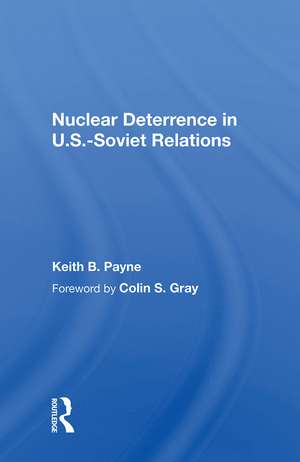Nuclear Deterrence In U.s.-soviet Relations
Autor Keith B. Payneen Limba Engleză Hardback – 7 iun 2019
Preț: 767.47 lei
Preț vechi: 1029.35 lei
-25% Nou
Puncte Express: 1151
Preț estimativ în valută:
146.86€ • 157.04$ • 122.45£
146.86€ • 157.04$ • 122.45£
Carte tipărită la comandă
Livrare economică 18 aprilie-02 mai
Preluare comenzi: 021 569.72.76
Specificații
ISBN-13: 9780367020071
ISBN-10: 0367020076
Pagini: 258
Dimensiuni: 149 x 229 mm
Greutate: 0.64 kg
Ediția:1
Editura: Taylor & Francis
Colecția Routledge
Locul publicării:Oxford, United Kingdom
ISBN-10: 0367020076
Pagini: 258
Dimensiuni: 149 x 229 mm
Greutate: 0.64 kg
Ediția:1
Editura: Taylor & Francis
Colecția Routledge
Locul publicării:Oxford, United Kingdom
Cuprins
A Westview Replica Edition -- Foreword -- Introduction -- The Assured Vulnerability Model of Deterrence -- Assured Vulnerability and the United States Strategic Force Posture -- The Inadequacy of Assured Vulnerability -- The Soviet Union: A Status Quo Power? -- Soviet Strategic Thought -- The Strategic Balance and the Value of Superiority -- An Adequate Theory of Deterrence: A Balanced Approach to Offense and Defense -- Summary and Conclusion
Descriere
This book critically examines U.S. attempts to establish a nuclear deterrent against the Soviet Union and offers new approaches to dealing with the changing strategic environment. Dr. Payne maintains that the most influential theories of nuclear deterrence--Assured Vulnerability and Flexible Targeting—are unrealistic, given Soviet foreign policy and attitudes toward nuclear war, and no longer adequately meet the requirements of U.S. national security. Identifying an approach compatible with U.S. security commitments, he argues that future U.S. policy should focus on defeating the "Soviet theory of victory"--on threatening Soviet military forces and domestic and external political control assets, while also defending the U.S. against nuclear attack. The discussion covers recent developments, among them the "new nuclear strategy" of the Carter administration and President Reagan's new weapons program.
